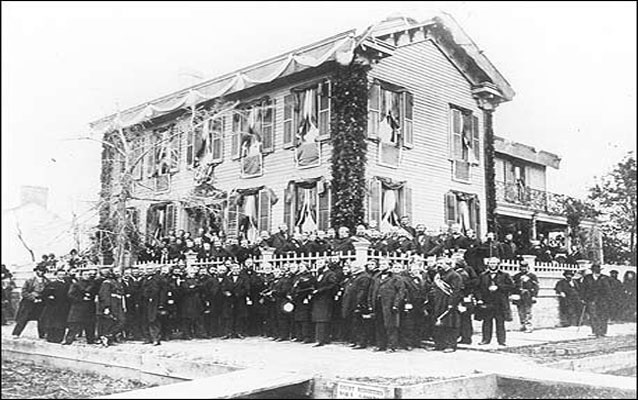Last updated: July 2, 2015
Lesson Plan
Dear Diary: Abraham Lincoln’s Reflections

- Grade Level:
- Middle School: Sixth Grade through Eighth Grade
- Subject:
- Social Studies
- Lesson Duration:
- 90 Minutes
- Common Core Standards:
- 6.RI.1, 6.RI.7, 7.RI.1
- State Standards:
- Indiana History Standard 8.1.25 Identify the factors, individuals, and events which influenced the outcome of the Civil War and explain the significance of each.
- Thinking Skills:
- Understanding: Understand the main idea of material heard, viewed, or read. Interpret or summarize the ideas in own words. Applying: Apply an abstract idea in a concrete situation to solve a problem or relate it to a prior experience. Creating: Bring together parts (elements, compounds) of knowledge to form a whole and build relationships for NEW situations. Evaluating: Make informed judgements about the value of ideas or materials. Use standards and criteria to support opinions and views.
Objective
How did the people, places, and events in the different stages of Lincoln’s life influence his development and contribute to his growth as an individual and future political leader?
Background
This is one lesson in the Lincoln Mosaic unit. In this unit, students will examine & analyze the significant people, places and events that contributed to the development of Lincoln both as an individual and as a leader among men. The Lincoln Mosaic unit is broken down into five lesson plans covering a ten day period. This unit can be modified to meet the needs of students with various ability levels as well as be altered to accommodate different types of class schedules.
In this lesson, students will combine all of their research knowledge of Lincoln and create a journal entry he might have written.
Preparation
- Decide whether to plan mixed-ability partnerships ahead of time or allow students to choose partner for the research.
- Make one copy for each student of the “Journal Entry Template”.
- Make one copy per group of all of the following materials: “Lincoln’s House Divided Speech”, “Lincoln’s Departure from Springfield Speech”, Account from book Meeting Mr. Lincoln, journal example sheet.
- Students will need paper, a highlighter, a pencil, and a colored pen.
Materials
Reading material to be analyzed by students.
Download Lincoln's House Divided Speech
Reading material to be analyzed by students.
Download Lincoln's Departure from Springfield Speech
Samples of the assessment to be used as an example
Download Sample Journal Entries
Lesson Hook/Preview
- On a piece of paper, ask the students to write a person or event that had a big impact on their lives. Then, ask them to write a description of a day when that person or event greatly influenced them.
- Ask students who feel comfortable to share.
- Explain to students that Abraham Lincoln did not keep a diary; however, there are man other primary sources that can be looked at to better understand his thoughts and reflections. Today and next class, they will be investigating those primary sources and creating diary entry that Lincoln might have written about events and people in his life.
Procedure
- Ask students to find a research partner. Divide the partners amongst three stations in your classroom. Each station should have a different primary source material available including: “Lincoln’s House Divided Speech”, “Lincoln’s Departure from Springfield Speech”, and the Account from book Meeting Mr. Lincoln.
- Tell the students that they should conduct their research by writing down any quotes, events, or people’s names that seem significant in Lincoln’s life. Give students 15 minutes at each station. Then, ask them to rotate to a different station or set of resources. After rotating to all three stations, give the students 15 minutes to return to any station they need to or to look back through their notes. They should be choosing the date or event they will write a journal entry about.
- After their research, hand out to each pair the sample journal entries and the journal entry rubric. Ask the partners to assess the sample journal entries.
- Debrief the assessments making sure to identify areas for improvement and strengths of each.
- Explain to the students that they will now individually write their own journal entry as Abraham Lincoln.
- Hand out the “Journal Entry Template”
- Give students 30 minutes to create their own journal entry. Remind students to cite their primary sources like in the sample.
- Ask students to find a peer edit partner who they did not work with during research. Give students 10 minutes to peer edit and assess their parterner’s journal entry using the rubric. Give students 5 minutes to share their feedback.
- Use the remaining 15 minutes for students to make final changes before submitting the finalized journal entry.
Vocabulary
Assassination - to kill suddenly or secretively, especially a politically prominent person
Social issues - an issue that influences and is opposed by a considerable number of individuals within a society.
Civil War - a war between citizens of the same country.
Presidency – the period of acting as the elected head of a country
Slavery – A condition of being legal property of another who is forced to obey and labor
Assessment Materials
President Lincoln's Journal EntryStudents will be writing a journal entry based on their research into the primary sources.
Rubric/Answer Key
President Lincoln's Journal EntryThis rubric assesses content understanding and research skills.
Journal Entry Rubric
Supports for Struggling Learners
*Heterogeneous grouping for researched and writing of journal article
*Highlighted or annotated primary sources for research
*Provide sentence starters to incorporate primary sources into the journal
Enrichment Activities
*Challenge the students to find an additional primary source on the Library of Congress website www.loc.gov to incorporate into the journal entry.
Additional Resources
Victoria Radford, Meeting Mr. Lincoln: Firsthand Recollections of Abraham Lincoln by People, Great and Small, Who Met the President (Ivan R. Dee, 1998).
Related Lessons or Education Materials
Lincoln Mosaic Unit
